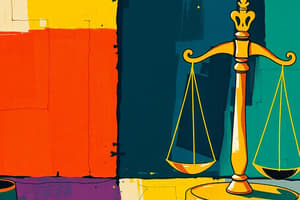Podcast
Questions and Answers
Which term describes the physical act or conduct that constitutes a criminal offense?
Which term describes the physical act or conduct that constitutes a criminal offense?
- Mens Rea
- Actus Reus (correct)
- Causation
- Defense
What is a felony characterized by?
What is a felony characterized by?
- Imprisonment for more than one year (correct)
- A minor violation typically punished by fines
- Imprisonment for less than one year
- Always involving severe property damage
Which of the following defenses argues that the defendant was compelled to commit a crime due to an immediate threat?
Which of the following defenses argues that the defendant was compelled to commit a crime due to an immediate threat?
- Mistake of Fact
- Self-Defense
- Insanity Defense
- Duress (correct)
In the context of crime, what does mens rea refer to?
In the context of crime, what does mens rea refer to?
Which principle requires that the actus reus and mens rea occur simultaneously?
Which principle requires that the actus reus and mens rea occur simultaneously?
What is the term for crimes that have begun but are not completed?
What is the term for crimes that have begun but are not completed?
Which of the following is an example of a strict liability offense?
Which of the following is an example of a strict liability offense?
Which of the following elements of a crime establishes a direct link between the defendant's actions and the resulting harm?
Which of the following elements of a crime establishes a direct link between the defendant's actions and the resulting harm?
Flashcards are hidden until you start studying
Study Notes
General Principles of Crimes
-
Definition of Crime:
- An act or the commission of an act that is forbidden or punishable by law.
-
Elements of a Crime:
-
Actus Reus (Guilty Act):
- The physical act or conduct that constitutes a criminal offense.
- Can include actions, omissions, or possession.
-
Mens Rea (Guilty Mind):
- The mental state or intention behind committing a crime.
- Varies by crime, including intention, recklessness, negligence, or strict liability.
-
-
Types of Crimes:
- Felonies: Serious crimes, often punishable by imprisonment for more than one year (e.g., murder, robbery).
- Misdemeanors: Less serious offenses, typically punishable by less than one year of imprisonment or fines (e.g., petty theft, vandalism).
- Infractions: Minor violations, usually punishable by fines (e.g., traffic violations).
-
Defenses to Criminal Charges:
- Insanity Defense: Argues that the defendant was not mentally competent at the time of the crime.
- Self-Defense: Justification for using force to protect oneself from harm.
- Duress: Claim that the defendant was compelled to commit a crime due to immediate threat.
- Mistake of Fact: Claim that a misunderstanding of fact negated mens rea.
-
Principles of Criminal Liability:
- Causation: Establishes a direct link between the defendant's actions and the resulting harm.
- Concurrence: Requires that the actus reus and mens rea occur simultaneously.
- Harm: Most crimes must result in some form of harm to a person, property, or society.
-
Inchoate Crimes:
- Crimes that were begun but not completed (e.g., conspiracy, attempt).
-
Vicarious Liability:
- Legal concept holding one party responsible for the actions of another, often in employer-employee relationships.
-
Strict Liability Offenses:
- Crimes that do not require proof of mens rea; liability is imposed regardless of intent (e.g., selling alcohol to minors).
-
Criminal Procedure:
- The legal process through which criminal laws are enforced, including arrest, charging, trial, and appeals.
-
Sentencing:
- The judicial determination of a criminal penalty, influenced by factors such as the severity of the crime, criminal history, and mitigating or aggravating circumstances.
Definition and Elements of Crime
- A crime is defined as an act that is prohibited or punishable by law.
- Actus Reus (Guilty Act) refers to the physical act that constitutes a criminal offense, including actions, omissions, or possession.
- Mens Rea (Guilty Mind) denotes the mental state or intention while committing a crime, including various levels of culpability such as intention, recklessness, negligence, and strict liability.
Types of Crimes
- Felonies are serious crimes, often resulting in imprisonment for over one year, examples include murder and robbery.
- Misdemeanors are less severe offenses, usually punishable by less than one year in jail or fines, such as petty theft and vandalism.
- Infractions are minor violations, typically carrying penalties of fines, such as traffic violations.
Defenses to Criminal Charges
- Insanity Defense asserts the defendant was mentally incompetent at the crime's time.
- Self-Defense provides justification for using force to protect oneself from imminent harm.
- Duress involves claiming that one was forced to commit a crime under immediate threat.
- Mistake of Fact argues a misunderstanding negated mens rea.
Principles of Criminal Liability
- Causation establishes a direct link between the defendant's actions and the resulting harm.
- Concurrence requires actus reus and mens rea to occur simultaneously for liability.
- Harm necessitates that most crimes result in harm to persons, property, or society.
Inchoate Crimes and Liability
- Inchoate Crimes refer to offenses that were initiated but not completed, such as conspiracy or attempts to commit a crime.
- Vicarious Liability holds one party responsible for another's actions, commonly seen in employer-employee dynamics.
- Strict Liability Offenses do not require proof of mens rea; liability is imposed regardless of intent, such as selling alcohol to minors.
Criminal Procedure and Sentencing
- Criminal Procedure is the legal framework governing how criminal laws are enforced, including steps like arrest, charging, trial, and appeals.
- Sentencing is the judicial determination of criminal penalties and is influenced by crime severity, prior criminal history, and mitigating or aggravating circumstances.
Studying That Suits You
Use AI to generate personalized quizzes and flashcards to suit your learning preferences.



